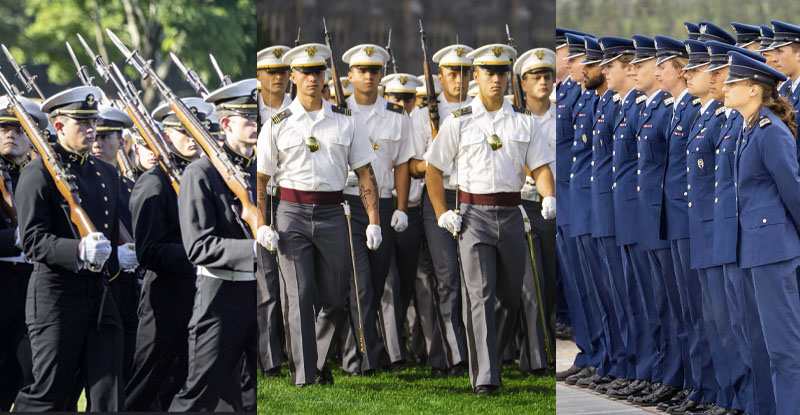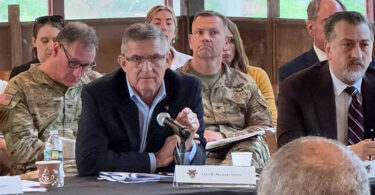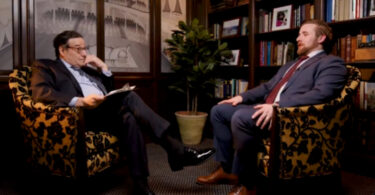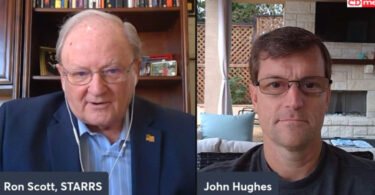By Lt Col. Ken Segelhorst, USA ret
In March 2025, the U.S. Air Force Academy announced that nearly 100 cadets were under investigation for cheating. It’s the latest in a growing pattern.
Once rare and met with mass expulsions, large-scale cheating scandals at the academies have become alarmingly common, and the consequences have become increasingly lenient.
The academies aren’t just struggling to prevent misconduct; they’re failing to enforce the standards that once defined them. Cadets are increasingly lying, cheating, and staying.
Over the past two decades, academic dishonesty has plagued the military service academies – the Air Force Academy (USAFA), the Military Academy at West Point (USMA), the Naval Academy (USNA), and even the Coast Guard Academy (USCGA).
Each time a scandal breaks, academy leadership issues reassurances, claiming their respective honor codes are intact and that guilty parties will be held accountable.
Yet the cycle continues. This is no longer about a few unethical cadets. It reveals a deeper cultural failure – one in which rules are flexible, accountability is inconsistent, and protecting institutional reputation takes precedence over upholding core values.
While the academies claim to commission leaders of character, their willingness to tolerate serious ethical failures suggests that character isn’t being instilled – it’s being overlooked or ignored when convenient.
A Pattern of Coordinated Dishonesty
These scandals are no longer isolated incidents of individual cadets succumbing to academic pressure. They are increasingly large-scale, coordinated violations of the very honor codes that define these institutions.
In 2020, the Air Force Academy investigated 245 cadets for cheating during remote final exams. An astonishing 231 admitted guilt. Only 22 were expelled.[1] The remainder received probation or remediation.
In response, then-superintendent Lt. Gen. Richard Clark stated, “The cornerstone of our academy is integrity; without it, we fail to accomplish our mission.”[2]
But words without action mean little. Less than five years later, the academy is once again engulfed in a scandal involving nearly 100 cadets.
West Point faced its own crisis in 2020 when 73 cadets were caught cheating on a remote calculus exam. Fifty-five of the cheaters were academy athletes, including 24 football players. It was the academy’s largest cheating scandal since 1976.
The leadership’s response was more revealing than the cheating itself. Then–Chief of Staff Col. Mark Weathers called the deliberate and coordinated violation of the Cadet Honor Code “disappointing,” but told USA Today he did not consider it a serious breach.[3]
The academy’s top leadership took it a step further. Then-superintendent Lt. Gen. Darryl A. Williams suspended a policy that would have prohibited guilty cadets from representing the academy in public forums, including athletics.[4] This move protected West Point’s football program – the academy’s biggest money-maker – from losing players during the season.
Rather than enforcing West Point’s honor code, its leaders worked around it. Only eight cadets were expelled. The majority were enrolled in a so-called “rehabilitation” program that involved journaling, writing essays, and meeting with mentors.
Many observers saw this as a strategic move to protect the institution’s athletic success, not its integrity.
In an ESPN interview around the same time, Williams bluntly stated, “Here at West Point, football is king.”[5]
Although the quote wasn’t made in response to the scandal, it mirrored Williams’ decision to suspend the academy’s normal honor policy – reinforcing the widely-held perception that protecting the football program took precedence over enforcing the Cadet Honor Code.
The Naval Academy also faced a large-scale scandal in 2020, when more than 100 midshipmen used unauthorized resources during a physics exam. Eighteen were expelled, while 82 were allowed to stay under a five-month remediation program.
As with the other academies, the Naval Academy’s response prioritized retention over enforcement. Despite the scale of the violation, Naval Academy leadership treated it as an isolated incident rather than a deeply rooted institutional failure. The incident quickly faded from public view, but it marked yet another moment when integrity took a back seat to image and internal convenience.
The Coast Guard Academy has not been immune. In 2016, 40 cadets were found guilty of cheating on an online quiz. In 2023, 55 admitted to sharing answers on navigation homework. None were expelled. Most received lowered grades and were placed in a 20-week honor remediation program.
At an academy where graduating classes average just 250 cadets, those cases involved 16% and 22% of a class – a staggering proportion. As with the Coast Guard Academy’s handling of Operation Fouled Anchor, the years-long cover-up of sexual assault investigations, the response to its cheating scandals prioritized appearances over accountability.
The table below captures the scale, frequency, and outcomes of these incidents – and illustrates the steady shift toward leniency.


Note: Every effort was made to compile the most accurate and well-documented information available. Each service academy was contacted directly and provided with a detailed summary of the data specific to their institution, along with an opportunity to review and address any potential inaccuracies prior to publication. Academies that did not respond by the stated deadline are presumed to have no objections to the accuracy of the information presented.
As the table shows, these scandals are not only becoming more frequent – they’re also involving more cadets, with fewer consequences.
Large-scale cheating scandals were once rare – and typically met with mass expulsions. From 1951 to 1999, they occurred about once every five years. But since 2000, they’ve grown more frequent, involved more cadets, and been met with increasingly lenient consequences.
The graphs make the trend toward leniency impossible to ignore. In the 1951 West Point scandal, 90 cadets were caught and all 90 were expelled. In the 2020 Air Force Academy scandal, 245 cadets were involved, but only 22 were expelled. In some recent cases, the expulsion rate has fallen below 10%.
What was once an automatic consequence is now negotiable. Accountability has been replaced by ambiguity, leniency, and concern for institutional optics.


The Failure of Accountability
Where expulsion was once the default consequence for honor violations, most cases today are funneled into what the academies call “developmental models” – a combination of journaling, mentorship, and guided “self-reflection” that amounts to little more than probation. These programs rarely instill meaningful accountability, yet they are now the standard response even for deliberate and coordinated breaches of their respective honor codes.
Even more troubling is the selective nature of accountability. Star athletes, well-connected cadets – including the sons and daughters of politicians, senior military leaders, or academy faculty – and those from demographics aligned with institutional diversity goals often receive preferential treatment. Others – those deemed expendable – are dismissed to maintain the illusion of enforcement. This isn’t leadership. It’s image management.
Investigations are often delayed or carefully staged for optics, ensuring the academy can claim to have “addressed the problem” while minimizing negative public exposure and avoiding real accountability.
Cadets are learning the wrong lessons: that honor is flexible when the institution’s image is at stake, that discipline is selective and consequences optional, and that if enough people cheat, the academy is more likely to protect them – and its reputation – than enforce its own code.
These selective punishments don’t uphold military values – they undermine them.
What This Means for the Force
The service academies aren’t just prestigious colleges with a military flavor. They have a mission: to produce commissioned officers who are expected to serve not only as leaders, but as the moral compass of their units. These institutions are entrusted with developing individuals who will be responsible for lives, for maintaining discipline, and for upholding the ethical standards of the military profession.
Integrity isn’t a footnote in that responsibility – it’s foundational to it. If cadets and midshipmen graduate having learned that accountability is conditional and consequences depend on status or convenience, what happens when they face real-world ethical dilemmas? What happens when they’re entrusted with decisions that carry serious operational or moral weight?
Clearly, many graduates are not internalizing the values these institutions claim to instill. And these high-profile scandals only capture the large-scale, coordinated incidents, not the countless smaller violations involving individuals or small groups that never make headlines. The problem runs deeper than the data suggests.
As West Point law professor Tim Bakken has warned, there’s no excuse for cheating at institutions charged with producing ethical leaders. When those violations are dismissed or minimized, the damage extends far beyond the academy walls.[36]
This isn’t just an internal leadership failure. When military institutions tolerate dishonesty at the ground level, they erode the trust and moral authority the American places in its armed forces – in peace and in war.
Integrity Shouldn’t Be Optional
In response to high-profile issues at the academies – including major cheating scandals, sexual assault rates that exceed those at civilian universities, and the use of illicit drugs – some faculty and staff have argued that cadets and midshipmen must be taught the difference between right and wrong.
But if the so-called best and brightest need to be taught that cheating on exams, assaulting classmates, or using cocaine on spring break is wrong, then the admissions process is failing – not just to identify talent, but to prioritize character.
These institutions must confront an uncomfortable truth: they have failed to instill and enforce the very values they claim to embody. That failure isn’t just about the cadets who cheat – it’s about the senior leaders who look the other way, bend the rules, and prioritize image over ethics.
This isn’t a call for zero tolerance or blind punishment. It’s a call for consistent, meaningful consequences. The solution isn’t checking boxes in a probationary program designed to give the impression that the issue is resolved and character restored – all to protect the academies’ image. It’s to enforce their honor codes as they were intended: as non-negotiable foundations of character and trust.
Restore the Standard
This isn’t about isolated scandals or a few bad cadets – it’s a systemic failure to uphold integrity as a core institutional value.
Superintendent of the Air Force Academy, Lt. Gen. Tony Bauernfeind recently admitted, “The prevalence of cheating and the method employed suggest a failure in our culture of honor, integrity, and accountability.” That’s not just an admission – it’s an indictment. And recognition without action is no longer enough.
Restoring the standard starts at the gate. If we’re prioritizing athletic performance, diversity goals, or public image over character, we shouldn’t be surprised when standards erode. If we’re recruiting cadets and midshipmen who need to be taught that cheating is wrong, we’ve already failed.
It doesn’t stop at admissions. The academies must stop tolerating dishonesty and start enforcing the standards they claim to uphold – clearly, consistently, and without exception. That means ending the double standards, the quiet remediations, and the policy workarounds that protect athletic programs, recruiting targets, and public image over principle.
The military cannot afford to commission leaders who believe integrity is negotiable. The nation cannot afford to place its trust in institutions that no longer believe in their own values.
That responsibility falls on academy superintendents, service secretaries, and senior military leaders – those entrusted not only with the mission of these institutions, but with protecting the values they represent.
Enough rhetoric. Enough excuses. Either restore the standard – or stop pretending it still exists.
—
**All four service academies were contacted for comment on the broader themes and findings presented in this article. The U.S. Naval Academy acknowledged the request but declined to provide a statement. The U.S. Military Academy, U.S. Air Force Academy, and U.S. Coast Guard Academy did not respond to multiple outreach attempts.
Ken Segelhorst is a retired U.S. Army lieutenant colonel with over 20 years of service. As a Green Beret and information operations practitioner, he operated extensively across the Middle East and Africa, leading combat operations and advising U.S. ambassadors and foreign officials. In addition to his operational experience, Ken served as an assistant professor at the United States Military Academy at West Point, where he was the course director for MX400: Officership, the superintendent’s capstone course. His time at West Point provided an unfiltered view of the cultural shortcomings and systemic challenges plaguing both the academy and the broader military, fueling his advocacy for greater accountability, reform, and transparency.
[1] https://www.airforcetimes.com/news/your-air-force/2022/04/14/air-force-academy-expels-22-cadets-for-2020-cheating-scandal/
[2] https://gazette.com/military/air-force-academy-discovers-widespread-cheating/article_4a98c018-f567-11ef-9cc4-7b1cb90dde10.html
[3] https://www.usatoday.com/story/news/politics/2020/12/21/west-point-catches-70-cadets-worst-cheating-scandal-50-years/5856130002/
[4] https://www.si.com/college/2020/12/30/west-point-cheating-scandal-army-football#:~:text=Lt,30
[5] https://www.npr.org/2020/12/22/949309336/west-point-professor-on-cheating-scandal-at-the-u-s-military-academy
[6] https://timesmachine.nytimes.com/timesmachine/1951/08/04/issue.html
[7] https://www.nytimes.com/1965/06/09/archives/cheating-by-cadets-admitted-by-air-academy.html
[8] https://time.com/archive/6880803/armed-forces-what-price-honor/
[9] https://time.com/archive/6880803/armed-forces-what-price-honor/
[10] https://www.nytimes.com/1972/01/21/archives/16-air-academy-cadets-guilty-in-cheating-inquiry-and-resign.html
[11] https://www.nytimes.com/1972/01/22/archives/23-more-air-cadets-resign-at-academy.html
[12] https://www.nytimes.com/1973/06/03/archives/dropouts-plague-the-air-agademy-attrition-rate-of-73-class-is-40.html
[13] https://time.com/archive/6880803/armed-forces-what-price-honor/
[14] https://www.nytimes.com/1984/09/20/us/cheating-prompts-air-force-to-halt-cadet-honor-boards.html
[15] https://www.nytimes.com/1976/09/05/archives/the-mess-at-west-point.html
[16] https://taskandpurpose.com/news/west-point-cheating-scandal/
[17] https://www.nytimes.com/1984/09/20/us/cheating-prompts-air-force-to-halt-cadet-honor-boards.html
[18] https://www.latimes.com/archives/la-xpm-1985-01-23-me-9797-story.html
[19] https://www.newsweek.com/school-scandal-176696
[20] https://www.csmonitor.com/1994/0124/24222.html
[21] https://www.cbsnews.com/news/new-scandal-at-air-force-academy/
[22] https://www.9news.com/article/news/local/air-force-academy-says-cadets-admitting-wrongdoing-in-cheating-probe/73-344916133?utm
[23] https://www.af.mil/News/Article-Display/Article/127590/investigation-continues-in-academy-cheating-incident
[24] https://www.denverpost.com/2007/05/01/15-booted-from-air-force-academy-in-cheating-scandal-3-resign/
[25] https://www.chronicle.com/article/18-cadets-are-expelled-or-resign-from-air-force-academy-in-cheating-scandal-122162/
[26] https://www.cbsnews.com/colorado/news/air-force-academy-begins-another-cheating-probe
[27] https://www.cbsnews.com/colorado/news/air-force-academy-begins-another-cheating-probe/
[28] https://www.chronicle.com/blogs/ticker/coast-guard-cadets-punished-after-cheating-probe
[29] https://www.cbsnews.com/news/three-face-expulsion-in-coast-guard-academy-cheating-probe/?utm
[30] https://www.armytimes.com/news/your-army/2021/04/18/51-west-point-cadets-caught-cheating-must-repeat-a-year/
[31] https://www.airandspaceforces.com/air-force-academy-separates-22-cadets-for-cheating/?utm_source=chatgpt.com
[32] https://www.nbcnews.com/news/us-news/18-midshipmen-exit-u-s-naval-academy-following-cheating-scandal-n1277366
[33] https://www.news.uscg.mil/Press-Releases/Article/3737554/coast-guard-academy-cadets-disciplined-for-distributing-answers-to-homework/
[34] https://www.courant.com/2024/04/11/55-coast-guard-academy-cadets-disciplined-over-homework-cheating-accusations/
[35] https://www.usafa.af.mil/US-Air-Force-Academy-News/Press-Releases/Press-Release-View/Article/4095987/academy-investigates-cadet-honor-code-violations/
[36] https://www.usatoday.com/story/news/politics/2020/12/21/west-point-catches-70-cadets-worst-cheating-scandal-50-years/5856130002/









Amazing stats. The regression of personal responsibility for
agregious cheating is alarming. Let’s hope that the trend going
forward is more honorable.
William Petruzel, USMA 1967
The solution is simple and to deny it absurd. When I was a cadet, I don’t think it was more than 24 hours before one convicted of an honor violation left the Academy for good. That was the standard, we all accepted it, and it was enforced. I haven’t the foggiest idea who thought it was beneficial to change that standard or why any such decision was approved. What was the result except for more honor violations because the “punishment” was forgiveness?